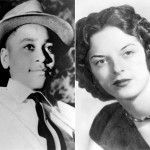| Anna King I Pendleton, Oregon 10 December 2009
Capturing the attention of children The first thing you notice when you walk inside John Bevis’ modest two-story is the smell. It’s earthy. And spicy. And welcoming. It comes from a pot of wild roots that simmers on the stove all day. The next thing you notice are Bevis’ tiny grandsons. They’re playing with (miniature toy) “matchbox” cars. Grandpa John Bevis sits down in his kitchen, and starts telling a story about how bear lost his long tail. “A long time ago, bear used to have a long fuzzy tail like the fox. And the fox got jealous of that, and he’d look at that goofy bear and say I’m gonna fix that bear someday. “ It’s hard not to get caught up in this funny story. John Bevis tells a lot of tales this time of year when life slows down. He says as long as there have been Indian people, there have been stories. Storytelling is something he learned when he was young. “Gathering the children and sitting around the campfire, you would kind of pick them (the stories) up as you eavesdropped on the older folks. Once the gossip started getting juicy then they would switch to Indian language. Because they knew we didn’t understand that.” Now he’s telling these cultural tales to his 14 children, 39 grandchildren and 9 great grandchildren. Some stories are religious, others are moral, like the one about how to behave when you fall in love. Many stories are instructional, describing the best ways to hunt, fish or gather roots. “We’ve got more than one story about gun safety. We’ve got stories about cleaning the game, taking care of the meat. “ Bevis tells these stories inside his home and at the Umatilla Reservation’s museum and schools. It’s important for him to share stories. Growing up in Pendleton he was often found himself in the middle of racial tensions because he was is part white. “I’m a lima. Lima is a term we use for half-breed. I’m neither here nor there. I’m in the middle. And some people frown on that and say it’s negative. But I always looked at it as a positive. Hey, I can bridge both worlds.” Stories provide a moral compass Now Bevis is using stories to help wipe away stereotypes. But he says even with stories where animals talk, sometimes it can be really hard to reach children. Bevis says growing up on-and-off the reservation is tough. Kids deal with alcohol, drugs and poverty. He says he recognizes the mixed-up pain in their eyes when he visits their classrooms. ” Maybe I am trying to make up for all that negativity and hate I had when I was a child. And wash it away and deal with the children. Don’t hate. You’re born into a situation that you may not like, poverty, and that weighs on children. We forget as adults what it feels like to be a child.” At one time it was easy for native children and adults to stay connected. Everyone lived together and they would gather in the winter lodge to tell stories. Bevis says the winter lodge is no more. Children are spread out in their own homes facing all kinds of challenges. He’s been there. Now, he says the stories are basically “to keep (the) faith.” Bevis says he hopes the stories he tells children today will help guide them as adults when faced with difficult decisions. “Maybe a story I told a long time ago that kid will carry with him, and he’ll make the right choice.” On this autumn morning in his warm home, those problems seem far away. The biggest distractions to Bevis’ bear story are matchbox cars and the flickering TV. But as Bevis keeps at it, his grandsons — Payton, 6, and Quintin, 2 — scoot a little closer, to make sure they don’t miss a word. Soon the tiny boys are nearly at their grandfather’s feet, lying on their tummies — listening. |
||
|

 In America’s Northwest Indian Country, the increasingly cold weather and shortening days signal a time to gather. It’s a time to nestle indoors and tell stories, and try to pass on Indian culture and religion to younger generations. Sharing these narratives has become a little harder in this age of computer games and smartphones. But on the Umatilla Reservation near Pendleton, Oregon, the oral tradition is alive and well in many Northwest Indian tribes.
In America’s Northwest Indian Country, the increasingly cold weather and shortening days signal a time to gather. It’s a time to nestle indoors and tell stories, and try to pass on Indian culture and religion to younger generations. Sharing these narratives has become a little harder in this age of computer games and smartphones. But on the Umatilla Reservation near Pendleton, Oregon, the oral tradition is alive and well in many Northwest Indian tribes.







